Professor of Biology Logan Randolph leaves a legacy with life experience passed on to students and colleagues
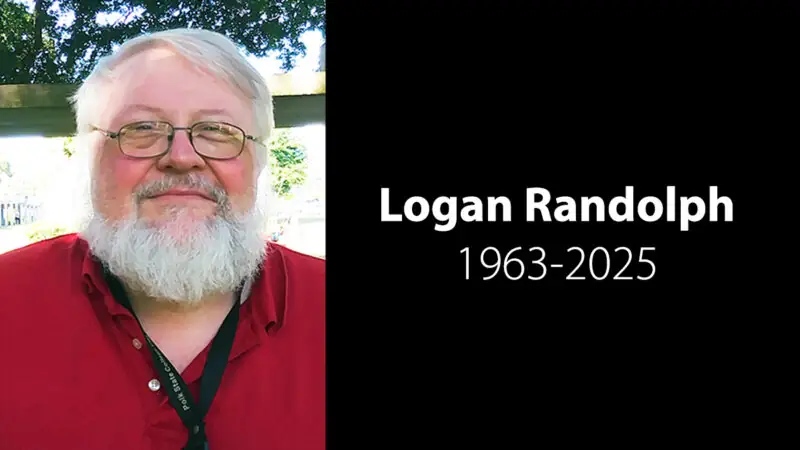
Dr. Logan Randolph’s journey to Polk State College was anything but ordinary.
Born on a working farm in rural Kentucky in 1963, he spent his early days among sprawling vegetation and open fields, which sparked a lifelong passion for biology, geology, and the natural world. His curiosity led him far beyond the rolling hills of his youth, to Miami University in Ohio for his doctorate, to China, where he taught in the 1980s and became fluent in Mandarin. It was there that he trekked across Western China, Pakistan, and Afghanistan to reach safety in India after Tiananmen Square, in which his passport and those of other Americans were seized.
When he returned to the U.S., he worked for several universities before moving to Florida, where he served the Department of Health and then the Department of Environmental Protection.
“After all this life experience, he came and taught at Polk State College,” Professor of Biology Anthony Cornett exclaimed. “He really wanted our students to experience the world the way he did, and that started with him bringing his level of experience to the College.”
Randolph, who served Polk State College as a Professor of Biology since 2008, passed away on June 10 at the age of 61.
“Something that always stuck out to me about Logan was his desire to care about things,” Cornett added. “Whether it was his students or this institution, his genuine care derived from his life experiences. He witnessed changes in history. He had experiences that no one else could ever replicate, and he brought that here to Polk State College.”
‘Professional but approachable’
Randolph operated with quiet authority, garnering respect from his colleagues and students naturally.
“He was professional, but approachable,” said Dr. Anthony Rizzo, Professor of Anatomy and Physiology, who worked with Randolph for more than a decade. “He was a no-nonsense teacher.”
“He wasn’t hard on his students, but the rules were there, and his students understood that,” he added. “I was always very impressed by that.”
Professor of Earth Science KT Moran echoed this, sharing that Randolph was “way more than what you could see.”
“It didn’t take long for him to demonstrate that to people,” she said. “He would do it in a quiet voice but in a persuasive way that was unique to him.”
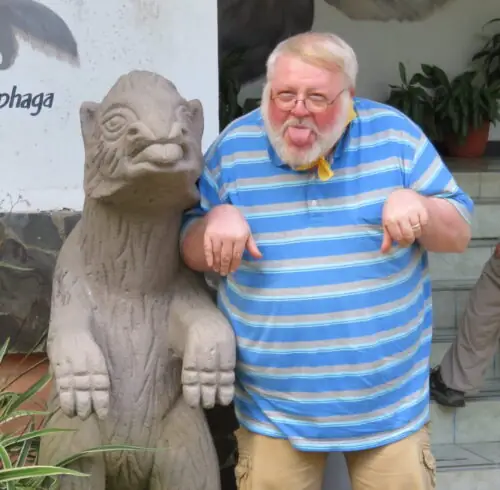
Professor of Biology Anthony Cornett jokingly called Randolph the “Biology Santa Claus” because of his white beard, and “he was always kind of jolly, giggling, and joke-y, but just as rigorous of a professor. He made sure his students were engaged so that they could understand biology from a common-sense perspective. He wanted them to know how it applied to their lives.”
Rizzo described Randolph as the type of instructor who never canceled a class. He stayed late to help his students and put in the extra hours to collaborate with colleagues on curriculum and initiatives new to Polk State College, including Study Abroad and Global Studies.
“The thing that was the most telling about Logan was when his husband passed away,” Rizzo reflected. “Logan came to teach his classes the very next day. He was very, very dedicated to his students.”
A talent for growing talent
A recurring theme among his colleagues and friends is Randolph’s ability to spot potential in others, even when they may not see it within themselves.
Natalie Whitcomb, a retired Professor of Earth Science, shared how Randolph changed the trajectory of her son’s life.
“My son would not be where he is today without Logan,” she said. “He took second-semester biology with Logan…, and one day Logan came up to him and asked my son, Eric, to apply for a job with UF/IFAS (University of Florida’s Institute of Food and Agricultural Sciences) where Logan had connections and would funnel students when help was needed.”
“He got the job, and one day at the breakfast table, Eric said to me, ‘Mom, I’ve never loved a job like I love this job.’ He went on to the University of Florida, majored in agriculture, completed graduate school at UNC (University of North Carolina), and now has a career in agricultural research,” Whitcomb said proudly. “He was floundering, but Logan saw something that I didn’t even see in Eric.”
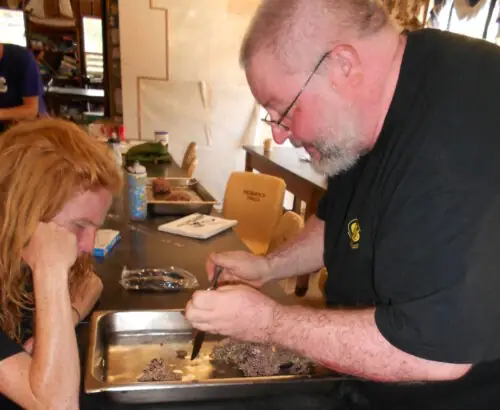
Randolph’s profound influence also extended to his colleagues.
Moran met Randolph in 2000 when they both worked for the Florida Department of Environmental Protection.
“We worked in different sections, but we were very aware of one another because our colleagues called us the Stern Scientifics,” she laughed.
“I remember asking him what he was doing there with a PhD in a bunch of fun stuff,” she said. “He said he was just trying to help Florida and pay the bills.”
Randolph held a doctorate in botany and anthropology, a master’s in mycology and biology, and a bachelor’s degree in botany – all from Miami University in Ohio.
For Moran, teaching was never on her radar, and “when I left the Department, I didn’t know I was on Logan’s radar.”
“I had never heard of Polk State and had never planned on teaching, but he needed someone with a background in sedimentology to teach oceanography,” said Moran, who joined the College in 2011 and now holds two of Randolph’s previous positions: Department Chair for the Winter Haven Campus Science Department and Coordinator for the Global Studies Program. “So much of what I’m doing now is thanks to Logan. I love being here and I love what we are doing for our students and our little family here.”
She shared a message that Randolph sent a week before he passed away.
“He said he thought he was just bringing me in as another faculty member who would do study abroad,” Moran said, “but that it turned into something he couldn’t have even imagined. That I had grown beyond what he expected. It made me cry.”
“Logan could see something in people that they may not see in themselves,” she reflected. “It was definitely a special talent of his.”
‘The grandaddy of agricultural research’
Colleagues also had a lot to share about Randolph outside of the classroom.
In 2012, he, Cornett, and Professor of Humanities John Barberet began the development of Polk State’s Study Abroad Program, which would offer one of its first opportunities in the Bahamas, where Randolph completed his graduate and doctoral work and lived on and off for nearly seven years. He was the first to conduct comprehensive botanical research on Andros Island.
Moran visited the Bahamas Agricultural and Marine Science Institute last year.
“I mentioned where I was from, and the gentleman still had Logan’s dissertation on his bookshelf. He said he uses it often – that it was the granddaddy of agricultural research,” Moran said. “Decades later, he is still having an impact on the island. No one has done more botany characterizations like he did.”
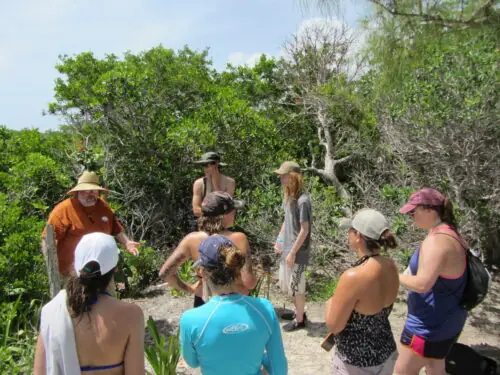
He also established opportunities that will continue to support students beyond his time, with a Bahamas trip still offered through the Study Abroad Program today.
“Some of our students at Polk State don’t see themselves as ‘college’ material and think that they are missing out on opportunities,” she added. “But Logan showed them that they can do it too.”
Randolph and his colleagues were also instrumental in securing a Transatlantic Friendship and Mobility Initiative Grant from the Embassy of France. This opportunity took a dozen students to the University of Antilles in Guadeloupe.
“That’s where I truly saw Logan in his element, surrounded by plants,” Cornett said. “Being out in rural Kentucky working on a farm must have triggered his love of plants, and then it just expanded from there to a love for geology – he had an extensive rock and geode collection – and a love for fungi.”
Back at home, Randolph also expanded access to hands-on, real-world learning for students. On the Winter Haven Campus, he established the greenhouse, where he invested upwards of $5,000 of his personal plant collection. Cornett and the Phi Theta Kappa Xi Pi Chapter he advises tend to the greenhouse today.
“Logan always found ways to engage his students,” Cornett said. “Even when you would see him lecture, the students were always listening to him. They were never zoned out.”
Rizzo and Whitcomb echoed this characterization of Randolph’s ability to captivate his students.
“Logan was never on autopilot,” Rizzo said. “He was truly dedicated to those students. Beyond the classroom, his students were always in his office, stopping him in the hallway, and staying after class to learn more from Logan.”
“He would engage his students through lab activities, hands-on opportunities, and perhaps most importantly, through conversation and by asking for their opinions,” Whitcomb added. “He was very dynamic both in the classroom and in the field.”
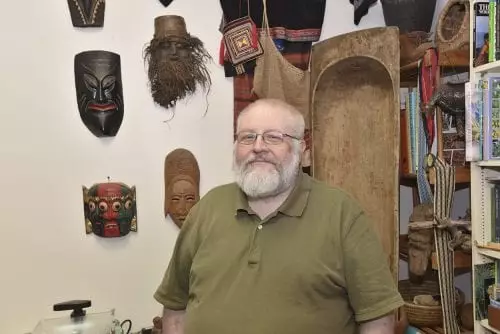
Spiders and frogs and fish, oh my!
Randolph’s interests were as diverse as his travels and teaching techniques.
In addition to plants, fungi and geodes, Randolph was well known and respected for his collections of tarantulas, poisonous frogs, and aquatic life.
The two-time Endowed Teaching Chair used his 2013 award to develop his campus science lab into a home for poisonous dart frogs that students raised from tadpoles and studied throughout their development. Meanwhile, his affinity for arachnids led him to serve as an expert source for national media.
“Logan meant business, but he was always happy to show off his dart frogs or talk about his tarantulas,” Cornett said. “That was just the type of person he was.”
Colleagues also recalled many field trips with Randolph, their students and the Cub Scouts to dig up fossils and shark teeth at the Peace River, and two-and-a-half-million-year-old crystals formed from hard clams called Mercenaria mercenaria at Rucks’ Pit.
“Logan was an avid fossil and mineral collector, and he took the opportunity to take students on field trips locally just as much as he was invested in study abroad opportunities,” Whitcomb said. “He made science accessible and approachable for students. His philosophy was very hands-on, play-based and applicable to our everyday lives.”
‘He was proud’
It’s clear that Randolph served as a foundation for Polk State’s Winter Haven Science Department family, and his daughter, Bailey, is a loving part of that.
Randolph coordinated a special celebration for her Polk State graduation in May 2020 due to the COVID-19 pandemic.
“Logan arranged for her to have a graduation and several of us, including President Angela Garcia Falconetti, put on our caps and gowns and met outside of the Science Building,” Rizzo recalled. “That says a lot about their relationship. He was proud, and I was honored to have been invited.”
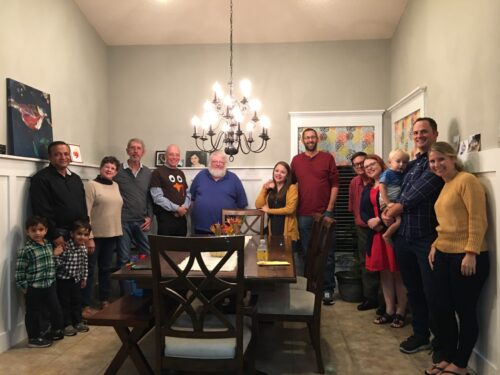
With her family, professors, and President Falconetti socially distanced and incredibly proud, she donned her regalia and was handed her diploma cover in front of the Winter Haven Science Building.
“This specialized graduation ceremony that Professor Randolph requested demonstrated the very fabric of our institution that unites us – this moment in time will live in my heart forever,” Falconetti said. “Professor Randolph will be missed immensely.”

